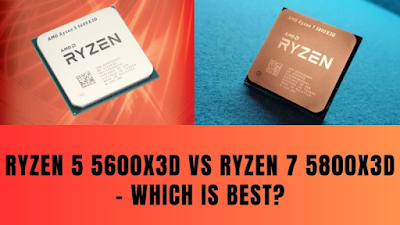If you are looking for a new desktop processor, you might be wondering which one is better: the Ryzen 5 5600X3D or the Ryzen 7 5800X3D. These are two of the latest CPUs from AMD, based on the Zen 3 architecture, that offer improved performance and efficiency over the previous generation. But how do they compare in terms of specs, features, gaming, and productivity? Let's find out.
Specs and Features
The Ryzen 5 5600X3D and the Ryzen 7 5800X3D are both part of the Ryzen 5000 series, which is compatible with most 400 and 500 series motherboards (after a BIOS update). They both have a TDP of 105W and support DDR4-3200 memory. However, they differ in core count, cache size, clock speeds, and price.
| CPU | Cores/Threads | Base/Boost Clock | Cache | Price |
| --- | --- | --- | --- | --- |
| Ryzen 5 5600X3D | 6/12 | 3.4/4.45 GHz | 64 MB (32 MB L3 + 32 MB L2) | $229 |
| Ryzen 7 5800X3D | 8/16 | 3.3/4.3 GHz | 96 MB (64 MB L3 + 32 MB L2) | $291 |
The main advantage of the Ryzen 7
5800X3D is that it has more cores and threads, which can help with multitasking and heavy workloads that can utilize them. It also has more L3 cache, which can improve memory latency and performance in some scenarios.
The main advantage of the Ryzen 5
5600X3D is that it has higher clock speeds, which can help with single-threaded and lightly threaded tasks that depend more on frequency than core count. It also has a lower price tag, which makes it more affordable and cost-effective.
Gaming Performance
One of the most common uses for desktop processors is gaming, so how do these two CPUs perform in this area? To answer this question, we can look at some benchmarks from various sources that compare the gaming performance of these two CPUs at different resolutions and settings.
According to these benchmarks, the Ryzen 7 5800X3D is slightly faster than the Ryzen 5 5600X3D in most games, especially at lower resolutions (1080p) and higher settings (ultra). The difference is usually around 5-10%, but it can vary depending on the game and the GPU used.
However, as the resolution increases (1440p or higher), the difference becomes smaller or negligible, as the GPU becomes more of a bottleneck than the CPU. In some cases, the Ryzen 5 5600X3D can even match or surpass the Ryzen 7 5800X3D at higher resolutions.
This means that if you are gaming at lower resolutions with a high-end GPU, you might benefit from the extra cores and cache of the Ryzen 7 5800X3D. But if you are gaming at higher resolutions with a mid-range GPU, you might not notice much difference between these two CPUs.
Productivity Performance
Another common use for desktop processors is productivity, such as video editing, rendering, encoding, streaming, etc. These tasks tend to benefit from more cores and threads, as they can parallelize the workload and speed up the process. So how do these two CPUs compare in this area?
To answer this question, we can look at some benchmarks from various sources that compare the productivity performance of these two CPUs in different applications and scenarios.
According to these benchmarks, the Ryzen 7 5800X3D is significantly faster than the Ryzen 5 5600X3D in most productivity tasks, especially those that can utilize all or most of the available cores and threads. The difference is usually around 20-40%, but it can vary depending on the application and the workload.
This means that if you are doing a lot of heavy multitasking or workloads that require high core utilization, such as video editing, rendering, encoding, streaming, etc., you will benefit from the extra cores and cache of the Ryzen 7 5800X3D. But if you are doing more light or moderate tasks that don't require as much core utilization, such as web browsing, office work, etc., you might not notice much difference between these two CPUs.
Conclusion
The Ryzen 5 5600X3D and the Ryzen 7 5800X3D are both excellent CPUs that offer great performance and value for money. However, they are suited for different needs and preferences.
The Ryzen 5 5600X3D is a good choice for gamers who play at higher resolutions or with mid-range GPUs, as well as for users who do more light or moderate productivity tasks. It offers higher clock speeds, lower power consumption, and lower price than the Ryzen 7 5800X3D.
The Ryzen 7 5800X3D is a good choice for gamers who play at lower resolutions or with high-end GPUs, as well as for users who do more heavy multitasking or productivity tasks. It offers more cores, threads, and cache than the Ryzen 5 5600X3D, which can improve performance in some scenarios.
Ultimately, the best CPU for you depends on your budget, your use case, and your personal preference. You can't go wrong with either of these CPUs, but you should choose the one that matches your needs and expectations better.

Post a Comment
Thanks for your comment.